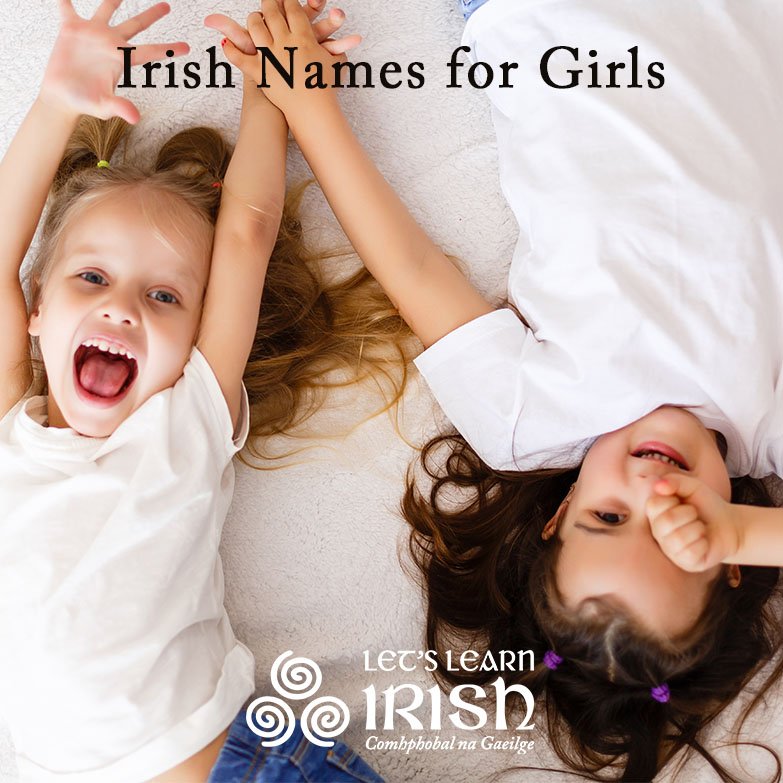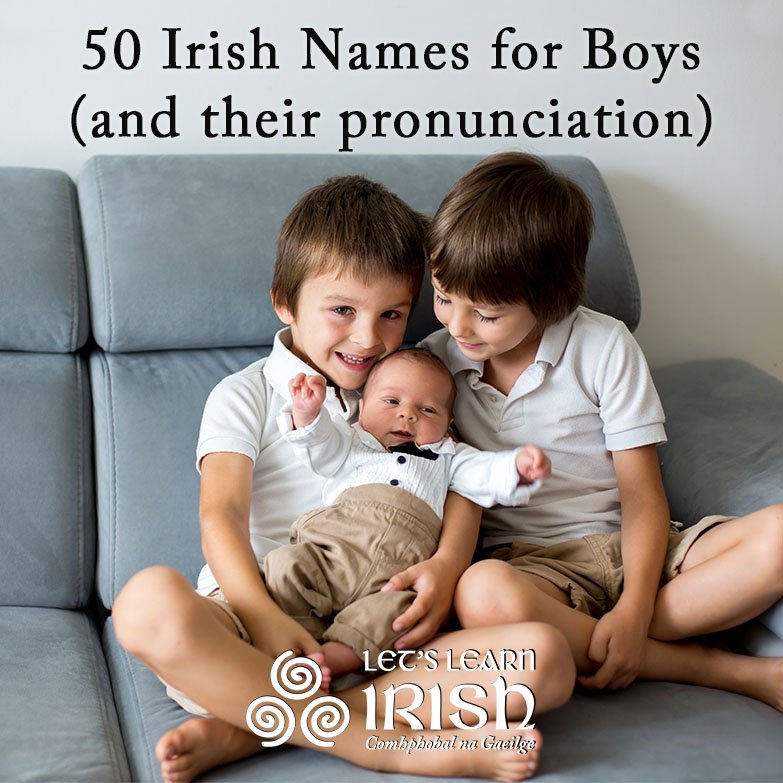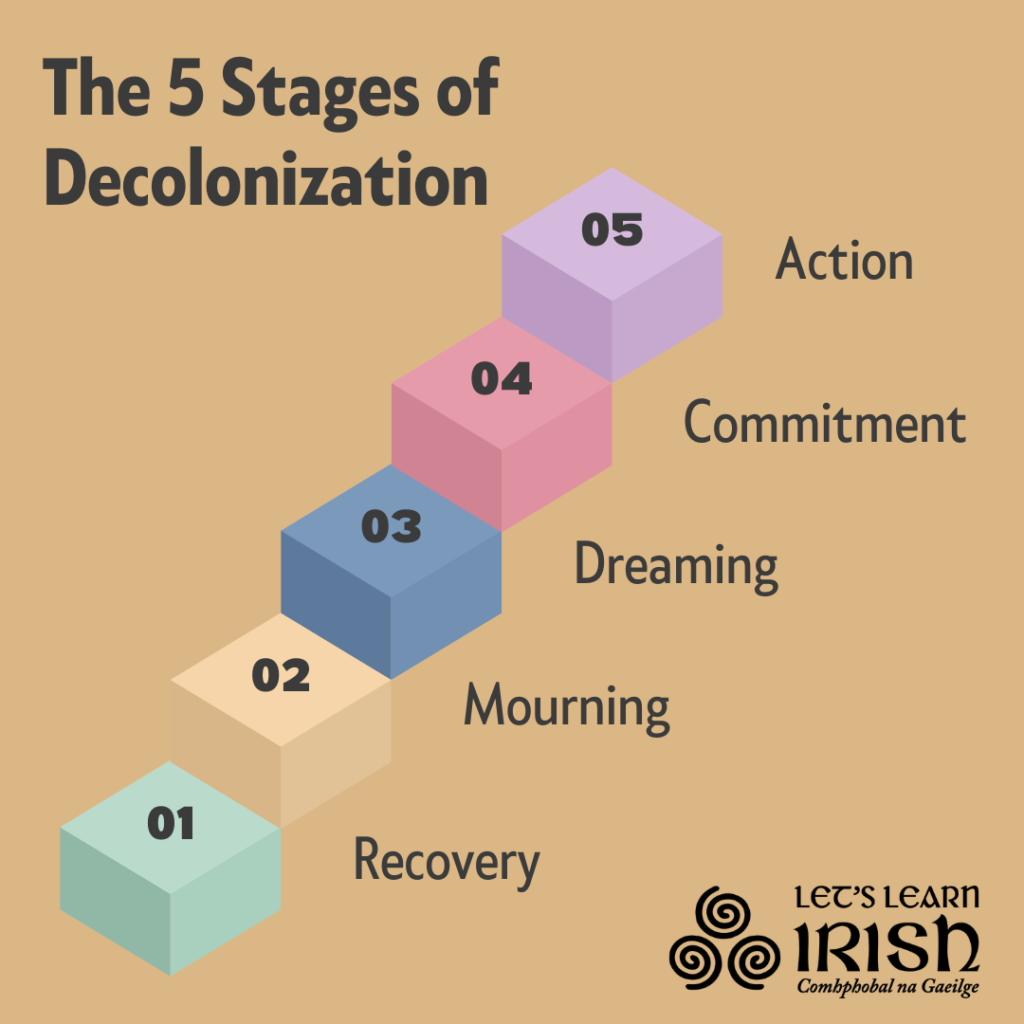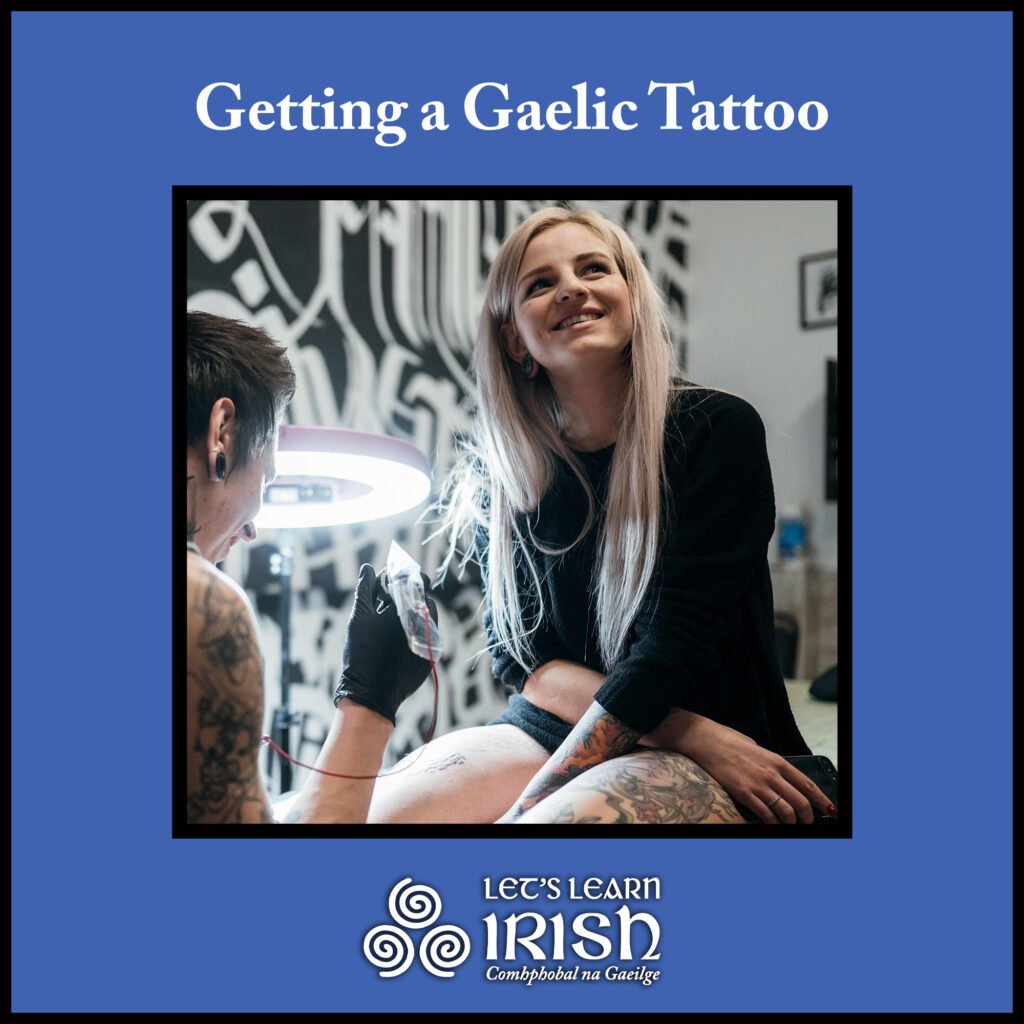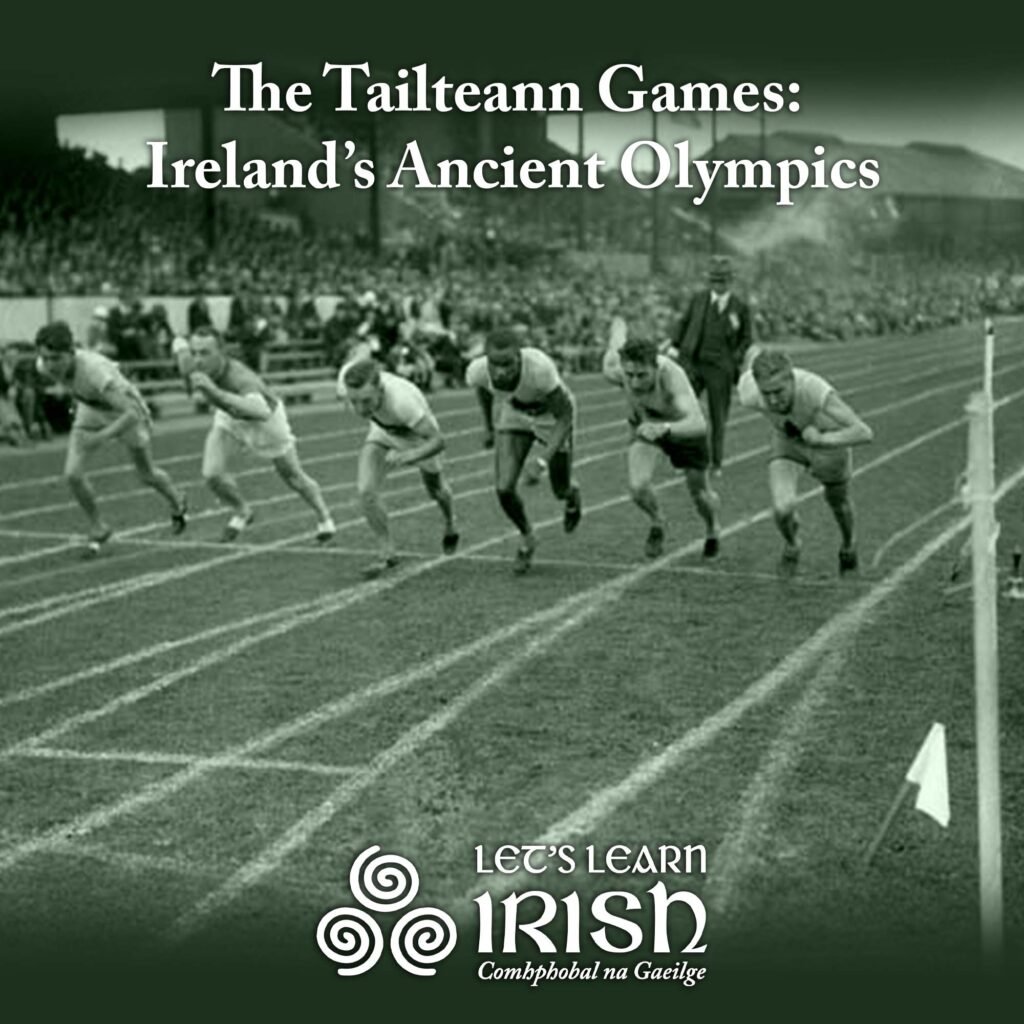Decolonize Your Hearts!
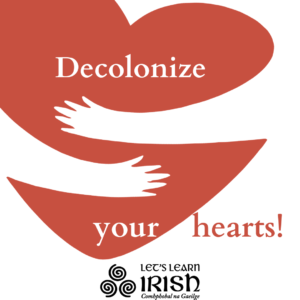 Colonization is not something we give too much thought to in modern Ireland. However, I believe a lot of our modern attitudes to the Irish language and all things Irish, are echoes of our ancestral trauma of the past. I think it’s up to us to at first become aware of this colonization of the mind, and then make it a priority to begin to decolonize our minds, our bodies, our lives. Consider this statement from Gearóid Ó Tuathaigh:
Colonization is not something we give too much thought to in modern Ireland. However, I believe a lot of our modern attitudes to the Irish language and all things Irish, are echoes of our ancestral trauma of the past. I think it’s up to us to at first become aware of this colonization of the mind, and then make it a priority to begin to decolonize our minds, our bodies, our lives. Consider this statement from Gearóid Ó Tuathaigh:
“The abandonment of a native language, to say nothing of it’s enforced abandonment, inevitably involves a disorienting rupture in cultural continuity at several levels; not only an alienation from landscape (place names) and inherited historical narratives and communal myths, but also a deep psychological trauma, at an individual and communal level, caused by the loss of a rich inherited matrix of wisdom and knowledge”.
Like many others, you may be feeling a call to reconnect with ‘an Ghaeilge’. You may want to get a deeper understanding of why we have such disconnection to Irish, or simply have Irish ancestry in your family. If so, you will likely benefit from joining the online Irish community for a class, comhrá session or group event. In my ‘Decolonization of the Gaelic Mind’ workshop, for example, I endeavour to create a space in which people can reconnect to their culture, customs and language, highlighting how important it is in our present day to decolonize our minds, honouring our ancestors, our heritage, the land and ultimately, ourselves.
A Laboratory for Imperial Prejudice
The Irish are not alone in the sufferings of colonialism during their history. Indigenous peoples across the globe have been oppressed, persecuted and stripped bare by Empire. According to Robbie McVeigh and Bill Rolston in ‘Ireland, Colonialism and the Unfinished Revolution’, Ireland was in many ways a laboratory for imperial prejudice. Contemporaneously, the colonization of North America was being carried out:
“The same indictments being brought against the Indians, and later the blacks, in the New World had been brought against the Irish…Both the Indians and blacks, like the Irish, were accused of being idle, dirty and licentious”.
In this, as in many other ways, Ireland became the training ground for growing English-and later British-imperialism. As Professor Nicholas Canny observes, “Their years in Ireland were years of apprenticeship”.
 Colonizers follow similar tactics, across the globe. Violence, forcing of their supposed ‘more civilised’ values, customs and language on to the native population and removal of native music, stories, or anything related to culture really. Colonial thought also dictates that land is to be taken, extracted from and/or usurped from the native population. This has occurred across the globe, and most definitely here in Ireland. Historically, we learned our local wisdom from our parents, elders, local community and all the while, deeply rooted in our local environment. Our forebears knew the importance of their local environment and that we are ‘fite fuaite’ (interwoven) with the land. Language and land are inseparable, so changing our relationship to the land and all living creatures is vital if we want to decolonize our hearts and minds.
Colonizers follow similar tactics, across the globe. Violence, forcing of their supposed ‘more civilised’ values, customs and language on to the native population and removal of native music, stories, or anything related to culture really. Colonial thought also dictates that land is to be taken, extracted from and/or usurped from the native population. This has occurred across the globe, and most definitely here in Ireland. Historically, we learned our local wisdom from our parents, elders, local community and all the while, deeply rooted in our local environment. Our forebears knew the importance of their local environment and that we are ‘fite fuaite’ (interwoven) with the land. Language and land are inseparable, so changing our relationship to the land and all living creatures is vital if we want to decolonize our hearts and minds.
A Universal Condition
I’ve previously written about how, through the National School system, teachers, parents and the wider community actively discouraged Irish through ‘an bata scóir’. The profiles of the Irish compared to that of other indigenous cultures around the world, who have also suffered severely under colonization, show striking similarities. The Irish and Lakota Sioux were compared and the findings were not surprising. Both of these cultures currently struggle with extremely high rates of alcoholism and drug addiction, both have experienced systematic repression of their religions, languages, music and other traditional cultural practices. High rates of substance abuse, a key marker of multi-generational trauma/PTSD, are found in all traumatically colonized indigenous people investigated including the Irish and Lakota Sioux. Similarities are also found with the Maori of New Zealand, Australian Aboriginal, Canadian Inuit people and other Native American indigenous peoples. I write this not with the intention of seeking a victim mentality to hide behind, or a competition of who has suffered the most in human history.
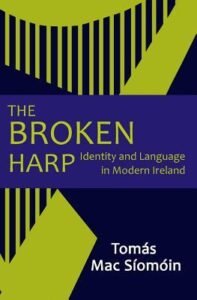 Of course we don’t want to use evidence of the effects of colonialism as an excuse for our modern problems, such as addiction, etc. However, I do think it’s important to know that we are not living in a vacuum, that us Irish are not the only people with historical chronic issues with addictions, and that there are others across the globe that we can relate to in some ways. Awareness is part of the process of change. We can’t change something about ourselves that we have no knowledge of, so hopefully with some insight into our past, we can begin to move forward and become who we want to be be from an enlightened, informed perspective.
Of course we don’t want to use evidence of the effects of colonialism as an excuse for our modern problems, such as addiction, etc. However, I do think it’s important to know that we are not living in a vacuum, that us Irish are not the only people with historical chronic issues with addictions, and that there are others across the globe that we can relate to in some ways. Awareness is part of the process of change. We can’t change something about ourselves that we have no knowledge of, so hopefully with some insight into our past, we can begin to move forward and become who we want to be be from an enlightened, informed perspective.
As Tomás Mac Síomóin states,
“Only by fully understanding cultural colonization, in both it’s historical and biological dimensions, and recognising its enduring effects, can we Irish begin to establish a firm basis for recovering intelligently parts of our ancestral heritage, above all that part encoded by our ancestral language, an Ghaeilge”.
The process of decolonization is neither short nor simple. Let’s begin with our hearts.
Related Articles:
– An Gorta Mór and the Irish Language.
– Super-Colonized Irish Syndrome.
– The Sapir-Whorf Hypothesis and ‘An Bata Scóir’.
– The Process of Decolonization.
Video:
View Conchobhar Ruadh’s workshop, ‘Decolonization of the Gaelic Mind’, here. This workshop explores the ways in which colonization has affected us mentally, and how we can begin reclaiming our unique heritage and language.
Bígí páirteach!
Join the online Irish community at LetsLearnIrish.com.
Follow on social media @LetsLearnIrish.

